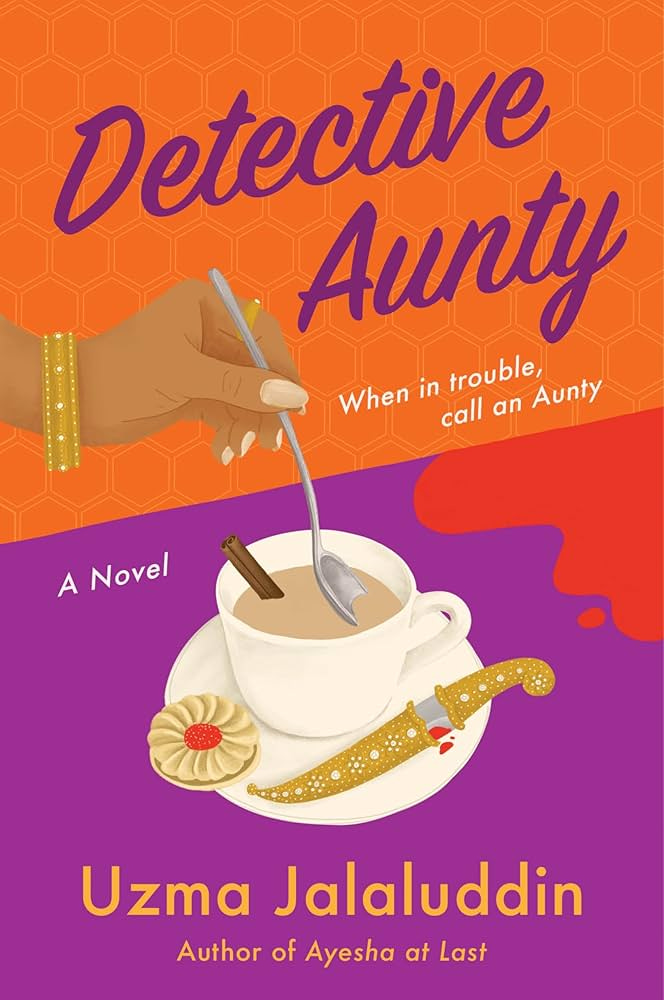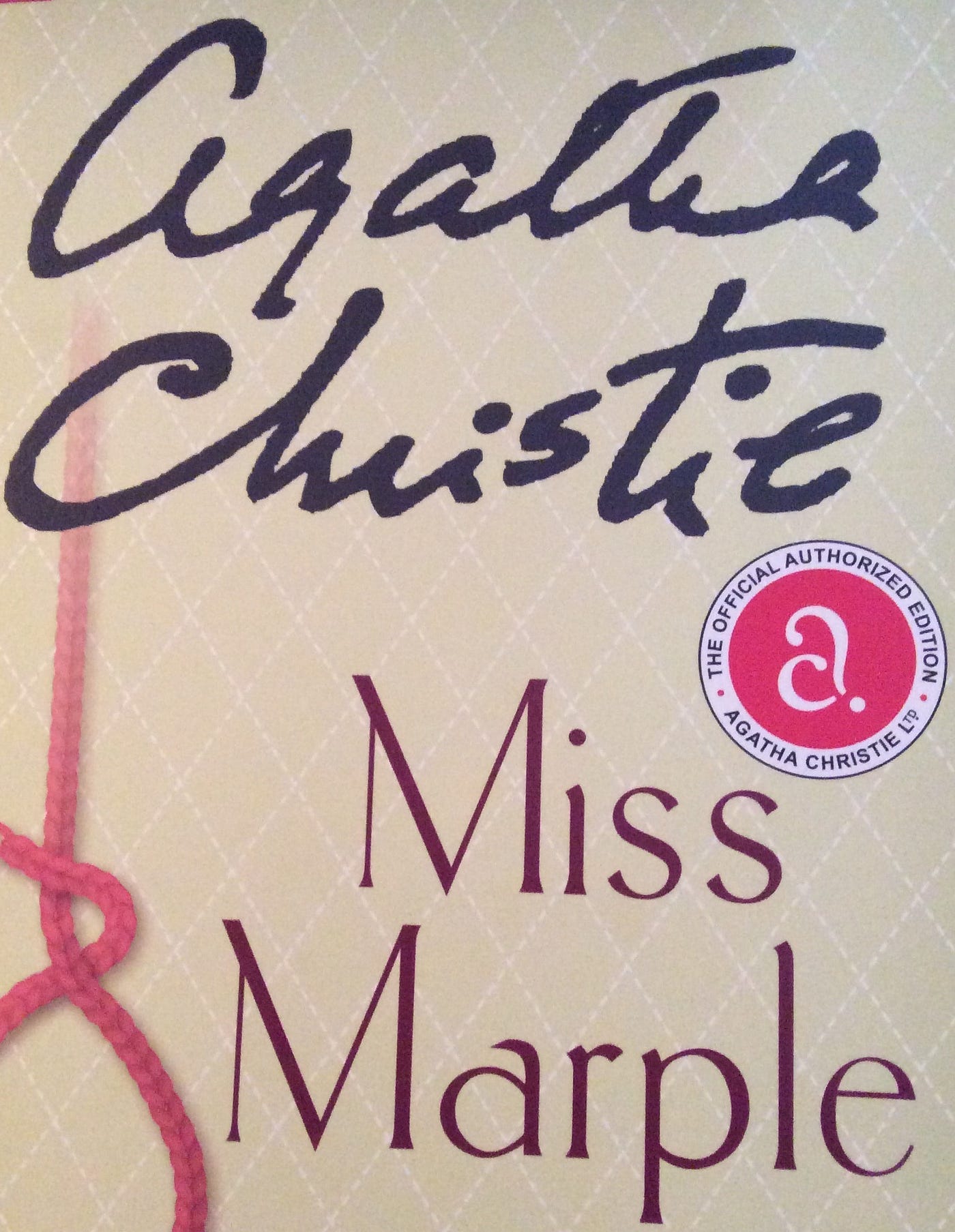How to write a mystery
What I learned from writing my debut mystery, DETECTIVE AUNTY (out May 6, 2025, from HarperCollins and HarperCollins Canada)
Hello hello friends, we (barely) got through January, but I have (modestly) high hopes for February! It is also one month until Ramadan, which kicks off March 1 this year (maybe! depends on the moon! it’s a whole thing!) and everyone I know is stockpiling samosas and making up their missed fasts from last year (all the smart girlies know to get them done in December, amiright?) Meanwhile, I’ve been hard at work drafting the sequel to DETECTIVE AUNTY, which will be my SEVENTH novel, Inshallah. Whew.
I’m a different person when I’m drafting and editing. Both happier and also crankier. Usual Uzma is calm, low-key. In-the-middle-of-drafting Uzma is story-obsessed, a bit feral, with a real this-could-have-been-an-email-or-text vibe. I’ll get into my usual drafting schedule in another substack post, but for now, I want to talk about how I learned to write mystery/crime.
DETECTIVE AUNTY is my debut mystery. I’ve so far written in the romance space, romcoms featuring Muslim, desi, Canadian characters in Ayesha At Last, Hana Khan Carries On, Much Ado About Nada and my co-written holiday romcom, Three Holidays and a Wedding.
So why mystery?
I’m a fan. In fact, romance feels more like a wonderful detour along my route to writing crime. I grew up reading Encyclopedia Brown, Nancy Drew, the Hardy Boys. As a young teen, I was introduced to Agatha Christie and never looked back. I’ve read thriller, suspense, historical and contemporary crime, cosy, noir, sci fi and fantasy…if there’s a mystery involved, I am in.
Fast forward to 2023, when I sell my mystery outline to HarperCollins, and finally sit down to write the book that becomes DETECTIVE AUNTY. Here’s the basic premise: Kausar Khan, a South Asian widow in her late fifties, married young, immigrated to Canada, and devoted her adult life to raising kids and being a homemaker. She is finally ready to start her second act when her adult daughter Sana is arrested on suspicion of murder. Kausar is pulled into the investigation, for which she has a Miss Marple-type ability to investigate.
I loved the premise of my new book. I was excited to write about Kausar and explore her world. The problems started when I started drafting, and quickly realized that crime writing required different tools and a new approach to my romance novels.
I did a lot of thinking, learning, and reading, and have compiled some of my main conclusions below. If you’re drafting a mystery, or would like to in the future, I hope this helps!
Uzma J’s Tips for Mystery-Writing:
1) THE CRIME
Who did it, why, and how? For the first book in a series with an amateur detective, the crime often involves a close friend or family member, thus justifying the sleuth’s involvement. If you are writing a cosy golden age mystery like I did, the method of murder won’t be that gruesome. Other crime novels will vary. As for motive, most people kill for money, love, anger, sometimes revenge. Pick one. Also consider how the killer will cover up their crime, as this is how clues and red herrings can be woken into the story.
2) THE VICTIM
Are they unlikeable, or a more sympathetic victim? Either can be fun to write. If they are unlikeable, it will be easy to come up with a list of suspects waiting for the chance to do them in. If they are likeable, consider the following: was the death an accident? Did the victim have a nefarious past?
3) SETTING
Where the story takes place is incredibly important, particularly in cosy mysteries. Readers want to exist in this world, so consider whether your story will best be served in a city, small town, a school or business, maybe in a particular country, or how about another planet? Wherever you set your mystery, the setting must play a role in the crime in some way. My mystery series is set in an east end neighbourhood of Toronto, with all of its distinctive culture and community. It feels like a small town, but is a large metropolitan city.
4) YOUR DETECTIVE
Who is your detective and how do they grow? Just as in romance, the detective must be missing something at the start of the mystery series, which they find over the course of the series or book. With cosy mystery, what they are often looking for is purpose, hope, family or community. Solving crimes becomes their raison d’etre. Remember that within a series, the detective’s relationship to the reader is the primary connection. Readers want a detective they find impressive and intriguing. As such, detective characters come in different but distinct flavours – the grizzled, cynical veteran; the ingenue; the aloof and arrogant genius, etc. They must have something unique about them to keep readers engaged. In DETECTIVE AUNTY, I was inspired by Agatha Christie’s Miss Marple, and built from there. My detective, Kausar Khan, is not a spinster like Miss Marple, but a widow who married young and spent most of her life caring for others. Kausar is ready to start her second act and discover who she really is; her journey transforms her from a hesitant, insecure person at the start of the book to a confident detective by the end.
5) THE TWIST
What is the twist that will surprise your readers? It can be a major jaw-dropper, or a more subtle one. Either way, seasoned mystery readers know never to take any character or plot point at face value, and they have been trained to be suspicious. Not every story needs a twist, but they have become a staple of the genre.
6) THE SUSPECTS
Develop 3-5 suspects, not including the real killer, each of whom is interesting and unique. Each suspect should have two things: 1) a secret they are hiding, which makes them act guilty, and 2) a clear motive to kill the victim. The detective will spend the majority of the investigation figuring out the secret each suspect is hiding: a secret affair, a gambling addiction, a dangerous habit, a crime they committed in the past. The job of each suspect is to keep your reader guessing until the very end. They also showcase your detective’s abilities, and distract readers from the identity of the real killer, so they continue to wonder ‘whodunnit’ until the very last page.
7) THE SIDEKICKS
Give your detective a support system. Perhaps a best friend, a sleuthing granddaughter, a spouse, a friendly police officer – someone they can bounce ideas off of, receive advice from, who remains their cheerleader or who calls them out when needed. This support system humanizes your detective, and will help the reader care about them further, and also provide stakes for the detective.
8) THE THEME
Settle on a theme for each book. This might just be me, but I need to have a deeper message, question, or idea I’m exploring in every book. Even in mystery, the point is not simply to unmask a killer, but to dig deeper. For DETECTIVE AUNTY, my central theme was the idea that a woman’s ambitions are always limited by circumstances, because this book at its heart is a meditation on second acts, second chances, and reinvention.
Do you have any suggestions of things to keep in mind when writing a mystery? Let me know in the comments. And please pre-order my debut mystery, DETECTIVE AUNTY, which publishes on May 6, 2025!
Thank you for reading Uzma’s Substack! Subscribe for FREE to receive new posts and support my work. I have no plans to charge for any of my posts. If you’d like to support me in other ways, please share this post with others, or consider purchasing my books, or borrowing them from the library.






I love reading mysteries too, Nancy Drew fan here, and aiming to write a murder mystery for my third book so this post is timely. My favourite part has to be the twists in the story. Love the cover of your book - it's perfect! Ramadan Kareem, I just started my first fast today. The sun's coming up as I write this.
This is such an enlightening post! Thank you for the insightful gems you've shared here. I haven't gotten over "Ayesha at last" and I practically screamed at the mention of a mystery novel from you! Can't wait to read it.